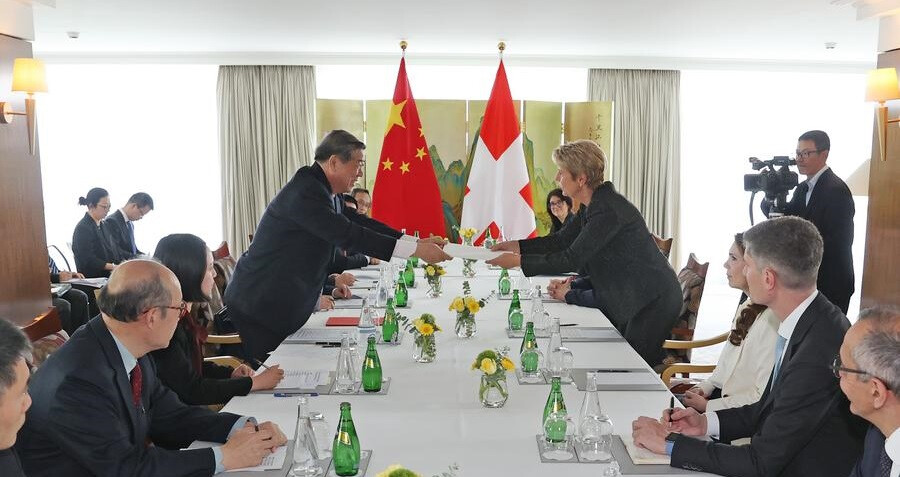
Geneva - Top leaders from China and Switzerland convened on Friday, agreeing to enhance communication, uphold free trade, and accelerate negotiations for the upgrade of their free trade agreement (FTA) amidst global challenges.
Swiss President Karin Keller-Sutter and Vice President of the Swiss Federal Council Guy Parmelin held discussions with Chinese Vice Premier He Lifeng in Geneva.
Vice Premier He conveyed warm greetings from Chinese leaders and delivered a personal letter from Chinese Premier Li Qiang. He highlighted the 75th anniversary of diplomatic relations between the two nations, emphasizing the mature and stable development of bilateral ties under the strategic guidance of their leaders.
He noted the increasing economic complementarity between China and Switzerland, leading to substantial achievements in trade and investment.
"In the face of the current complex and grave international situation, it is imperative for China and Switzerland to strengthen communication, build consensus, and jointly address global challenges," Vice Premier He stated.
He urged both sides to safeguard free trade and open markets, expedite substantial progress in the FTA upgrade negotiations, and contribute to global peace, stability, and economic prosperity.
President Keller-Sutter acknowledged the close high-level exchanges between Switzerland and China in recent years. She affirmed Switzerland's readiness to work together for the successful hosting of the "China-Switzerland Year of Culture and Tourism" in commemoration of their 75th anniversary.
She added that Switzerland is committed to enhancing exchanges at all levels with China, deepening practical cooperation in various fields, and elevating bilateral relations to a new level.
Vice President Parmelin echoed this sentiment, stating that Switzerland supports multilateralism and free trade. He expressed hope for a swift conclusion to the FTA upgrade negotiations with China, aiming for a more comprehensive and ambitious agreement that would bring greater benefits to businesses and people in both countries.
He also emphasized Switzerland's commitment to deepening economic and trade cooperation with China across all sectors and safeguarding the stability of global industrial and supply chains.
This high-level meeting underscores the significance of China-Switzerland relations in a complex global landscape and charts a course for future cooperation. The mutual commitment to accelerate FTA upgrade negotiations signals their shared dedication to upholding the free trade order amidst rising protectionist sentiments.
China and Switzerland have maintained stable bilateral ties for a long time, forging a mutually dependent economic relationship. Switzerland, a major European financial hub and a leader in advanced technology, has played a crucial role in China's economic development. Conversely, China's vast market potential has offered attractive investment opportunities for Swiss companies.
The existing China-Switzerland FTA, which came into effect in 2014, has contributed to lowering trade barriers and promoting economic cooperation. The current upgrade discussions aim to broaden the scope and enhance the quality of the agreement to reflect new economic realities such as the digital economy, trade in services, and investment protection. This is expected to provide a wider and more stable business environment for companies in both nations and ultimately improve the economic well-being of their citizens.
Switzerland's strong support for multilateralism and free trade, evident in its emphasis on upgrading the FTA with China, aligns with its traditional foreign policy. As a neutral country, Switzerland has historically played a vital role in mediating international interests and upholding a rules-based international order. By upgrading the FTA, Switzerland seeks to strengthen its economic partnership with China while contributing to the stability of the global trade system.
For China, securing stable foreign relations and a free trade environment is crucial for its continued economic growth and development. Especially amid ongoing trade tensions with the United States and increasing scrutiny from some Western nations, strengthening cooperation with advanced European economies like Switzerland holds strategic importance. Upgrading the FTA can deepen economic ties, improve access to the European market, and facilitate the attraction of advanced technology and investment.
During the meeting, both countries also agreed to expand exchanges in culture and tourism, designating 2025 as the "China-Switzerland Year of Culture and Tourism." This initiative aims to enhance mutual understanding and further solidify friendly relations through various exchange programs, demonstrating a commitment to a multi-faceted development of bilateral ties beyond economic cooperation.
However, the smooth progress of the FTA upgrade negotiations remains uncertain. Differences in views on new issues such as the digital economy, environmental standards, and labor conditions could pose challenges. Furthermore, evolving China policies in neighboring countries like the European Union could also influence the negotiation process. Therefore, both sides will need to maintain constructive dialogue based on mutual understanding and trust.
In conclusion, the high-level meeting between China and Switzerland marks an important step towards the positive development of their bilateral relationship. By pushing for an FTA upgrade, both nations aim to strengthen economic cooperation and pursue common interests in a complex international environment. The international community will be closely watching the progress of these negotiations.
[Copyright (c) Global Economic Times. All Rights Reserved.]



























